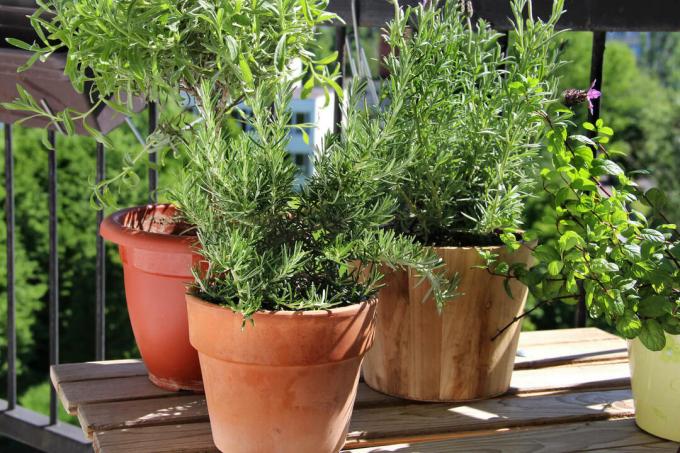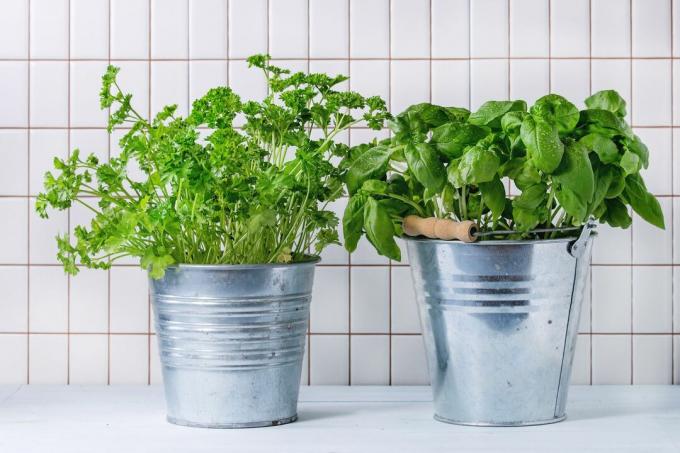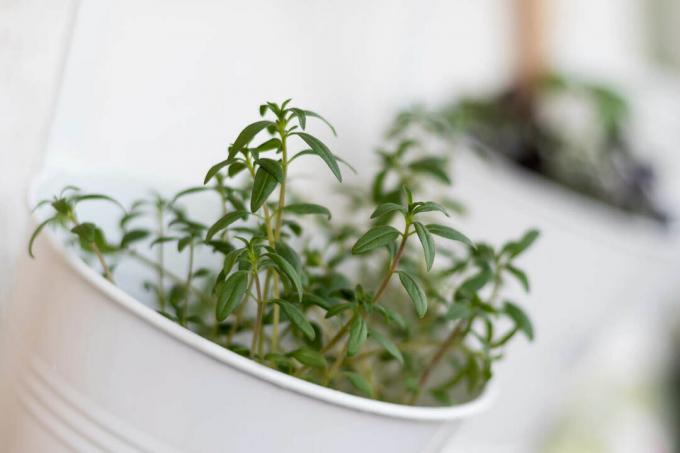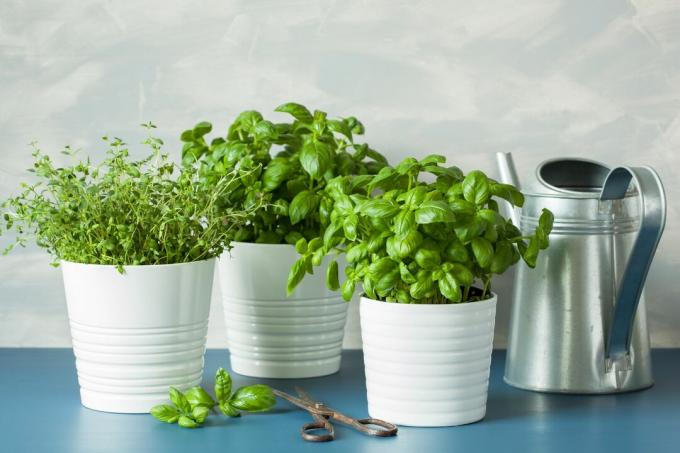Many kitchen herbs can be easily cultivated in pots. We show which herbs are suitable for growing in pots and the best way to plant and care for them.

Even in the city or in a small apartment, you don't have to do without fresh kitchen herbs, because many can also be planted in pots. These are then best placed on the balcony or outside on the windowsill. You can even keep your herbs right in the kitchen. But the herb pots also look great outside on the terrace or balcony.
contents
- Herbs for the pot: These types are suitable
- Planting herbs in pots: you should pay attention to that
- How to care for herbs in pots
Herbs for the pot: These types are suitable
In principle, most species are suitable for planting in pots. Of course, the size of the pot is the key here. Some types such as dill (Anethum graveolens), tarragon (Artemisia dracunculus), Southernwood (Artemisia abrotanum) or lovage
(Levisticum officinale), however, have a fairly wide and deep root system. These types of herbs do not do well in a confined container as they cannot develop their roots properly.On the other hand, the following are perfect for the pot on the windowsill, terrace or balcony:
- parsley (Petroselinum crispum ssp. crise): Parsley is biennial. If it is wintered cool and frost-free, it can also be harvested over the winter and forms seeds in the second year, which can then be sown for new parsley plants.
- basil (Ocimum basilicum): Basil is one of the Mediterranean herbs. It needs sun and plenty of warmth to thrive. In the pot you can grow it early in the year.

- chives (Allium schoenoprasum): As a bulbous plant, the perennial chive loves loose soil and is overwintered in a cool place in order to sprout fresh and new in the spring. It does well in most locations. Chives do well in the sun as well as in the shade and semi-shade.
- lemon balm (Melissa officinalis): Keeping the robust lemon balm is extremely uncomplicated. Even in the pot, it develops into a strong plant every year after new shoots.
- mint (mentha): The different types and varieties of mint look wonderful in the pot. In addition, this herb reliably comes in the following year. Its demands on the location are low and so the mint thrives in both sunny and shady locations if it is only occasionally watered and fertilized.
tip: More tips on growing Herbs on the windowsill can be found in our special article.

A nutrient-rich soil like ours is suitable for nutrient-hungry herbs like the ones mentioned above Plantura organic tomato and vegetable soil. With a high compost content, it ensures a generous supply of nutrients and water storage capacity - because not all herbs thrive optimally in nutrient-poor herb soil. More to Nutrient supply of herbs we have compiled for you elsewhere.
Mediterranean woody species can also be kept in pots without any problems. These include:
- sage(Salvia officinalis)
- lavender (Lavandula angustifolia)
- thyme (Thymus vulgaris)
- savory (Satureja spec.)
- rosemary (Rosmarinus officinalis)

The above and other frugal herbs love permeable, even stony soil and only develop a lot of essential oil and thus a lot of aroma if there is a suitable shortage of water and nutrients. Therefore, they do better in pots in well-drained herb soil like ours Plantura organic herb and seed soil planted. For more nutrient-sensitive herbs, see the related article on “fertilize herbs “.
Planting herbs in pots: you should pay attention to that
Many herbs can also be combined in a larger pot. However, keep in mind the different claims of these herbs. The frugal, Mediterranean species should not be mixed with nutrient-hungry and moisture-loving herbs be placed in a pot, otherwise there will inevitably be problems with appropriate fertilization and water supply.
It is better to use a pot with more drained herbal soil and one with more nutritious tomato and vegetable soil to fill and to combine matching plants.
Tip: Mediterranean herbs can also be arranged decoratively in the pot with large and small stones. With very large planters, it is even possible to make the herbal soil even more permeable with additional stones or expanded clay.
You can buy many herbs in the pot in the shop. In this case, however, you should repot the herbs and give them more space and a higher-quality substrate. Ours is perfect for these herbs Plantura herbal and seed soil. With its slightly acidic to neutral pH value and the high proportion of compost, it offers optimal conditions for most herbs. In addition, it is organic and particularly climate-friendly due to the absence of peat. Ours is also for reseeding herbs Plantura herbal and seed soil best for.

Woody Mediterranean herbs such as rosemary or sage, on the other hand, prefer nutrient-poor substrates with a basic pH value. It is better to put these herbs in a mixture of garden soil and sand and add some lime if necessary. For example, you can mix in a few limestones or finely grated egg shells.
The pot for your herbs is better to be too big than too small. Since you certainly want to harvest bountifully, it is advisable if you give your herbs enough space for the roots. This is the only way they can develop an efficient root system and form a lot of leaf mass. Aside from that, a larger pot volume dries out less quickly, so you don't have to rush out with the watering can as often.
How to care for herbs in pots
Plants in pots depend on you and need a little more care than their peers in beds.
Pour herbs in the pot:
Because their roots are constrained by the vessel, they only have what's in their pot for water and nutrients. Herbs in the pot must therefore be watered regularly. Even if they are outside, the rain is usually not enough in dry summers. Chives, parsley and co. should therefore be watered more often, especially in sunny places. However, do not overdo it so as not to dilute the taste. Mediterranean herbs like rosemary and thyme can do well with less water. You should only water these plants when the soil on the surface has dried out.

Fertilize herbs in the pot:
As far as fertilization is concerned, even for nutrient-loving plants such as basil and chives, one application in spring and another in early summer is usually sufficient. Suitable are here compost or primarily organic long-term fertilizers, especially when repotted in spring. Alternatively, a purely organic liquid fertilizer like ours can be used every two to three weeks Plantura organic tomato and vegetable fertilizer be used to avoid having to laboriously work fertilizer granules into small pots. You can also use the tried and tested coffee grounds for fertilization here. If you have just sown or repotted your herbs in the spring, you can do without the nutrients in the spring.
Tip: Liquid fertilizers never contain all of the essential nutrients, as these would precipitate in the liquid into insoluble compounds. Therefore, it makes sense to repot herbs in pots regularly or occasionally with an organic complete fertilizer like ours Plantura organic universal fertilizer to fertilize.
Mediterranean herbs such as rosemary, marjoram, sage and thyme, on the other hand, require fewer nutrients and should be fertilized at most once a year. A slow-acting, solid fertilizer granulate is also best used here.
Tip: With our Plantura herb growing set the cultivation of herbs in the pot succeeds without any problems. The set contains everything you need for growing herbs and is also an excellent gift idea.
Cutting herbs in the pot:
Where little space is available, the compact growth of herbs is particularly important. With an annual pruning in spring, perennial, woody herbs will branch lower and grow more bushy.
Overwintering herbs in the pot:
Like all plants in pots, herbs are also very susceptible to frost, as the entire pot can easily freeze through, which can cause irreversible root damage to the plant. On the other hand, almost all herbs come from climates where they are allowed a cool and dark winter break. They need this rest phase, otherwise they will continue to exhaust themselves and eventually die. Therefore, herbs in pots should overwinter in a cool and moderately bright place with little water and without fertilization. Overwintering in warm living spaces is almost never successful or causes problems with diseases and pests. Some herbs such as chives and parsley die above ground in winter and sprout again in spring. to overwinter basil is something for experienced herb gardeners: You will therefore find further information on this topic in our special article.

Repot herbs:
Like all potted plants, it is also important to repot herbs regularly in order to replenish the available supply of trace elements. In addition, any substrate will sag somewhat over time, which hinders root growth and nutrient uptake. Herbs should be repotted at the latest when roots have penetrated the entire volume of the pot or when only restrained growth can be observed despite regular fertilization. How your Harvest herbs properly, you can also find out more in our further article.

